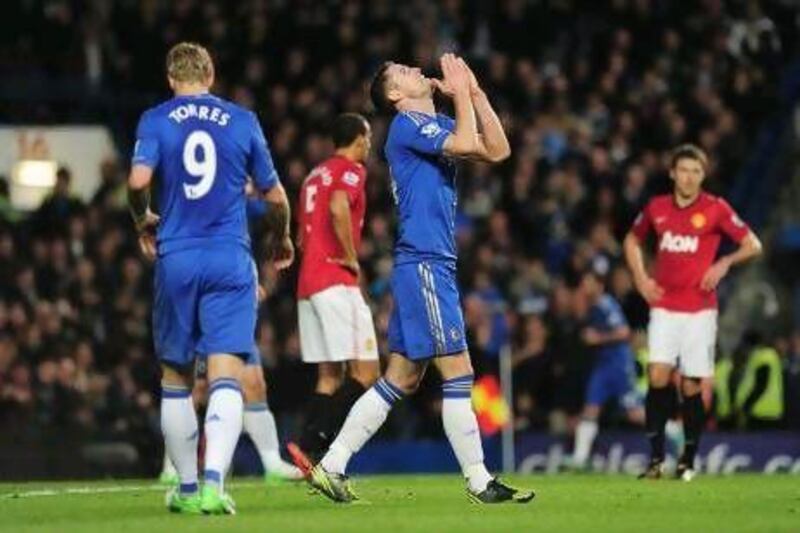Long before cycling's governing body attempted to erase Lance Armstrong from Tour de France history, an asterisk was attached, literally or metaphorically, to tainted champions' names. They were winners but, at the same time, not proper wins.
It is a way many in football, from the stands to the dressing room, react to a loss. When a defeat is not seen as deserved, when a sense of injustice lingers, the fixture list has a metaphorical asterisk ascribed to certain games. Sunday was a case in point.
Chelsea drew 2-2 with Manchester Unitedwith 11, and even 10, men. The eventual outcome - a 3-2 setback - came courtesy of Javier Hernandez's offside winner after the disputed dismissal of Fernando Torres.
A caution for simulation, despite Jonny Evans making clear contact with the tumbling Spaniard, seemed harsh, even if his earlier kung-fu kick at Tom Cleverley could have resulted in an immediate expulsion.
Under the circumstances, analysis could be invalidated. Chelsea could simply wonder if, having mounted a stirring comeback from 2-0 down, whether they would have won with a full complement of players.
And Sunday was revealing of the shortcomings of a star-studded side. The rebranded Chelsea, all flair and fun, are a team whose strengths are also their weaknesses.
The trio of Juan Mata, Eden Hazard and Oscar are defining the new era at Stamford Bridge and tormenting opponents; not with physical force, as Didier Drogba did in days gone by, but with craft and creativity, elegance and excellence.
Their second goal, with delicate, delightful touches from both Oscar and Mata, highlighted their quality. The Spaniard, the scorer of the first, is in irresistible form.
Yet men who are the scourge of opposing defenders are also a risk to their own rearguard.
On Friday, Sir Alex Ferguson was asked about the finest Chelsea team he has faced. He nominated Jose Mourinho's side, calling them "formidable" and "difficult to play against".
The reason, beyond the blend of efficiency and unquenchable spirit that propelled them to back-to-back titles, was that Mourinho's men used all 10 outfield players to protect their goal.
Roberto Di Matteo's class of 2012 only defend with six. Besides his unrivalled ability to intimidate, Drogba may have been the best defensive striker of his generation. Torres is no such asset to his back four.
But the essential difference comes in the three attacking midfielders. Ferguson is not always described as a tactical genius but he dissected Chelsea beautifully in the opening minutes.
Hazard, Mata and Oscar may interchange positions, but none protect the full-backs. United played with wingers, opted for pace on the flanks - especially the electric combination of Antonio Valencia and Rafael da Silva on the right - and knew they could get a numerical advantage when going forward on either side. It was a method that produced both early goals.
Meanwhile, the right-back Branislav Ivanovic has been reinventing himself as an eager attacker. In the process, he leaves space behind him and, for all the Serb's strength, he can lack the pace to get back into position.
Ashley Young made a series of diagonal runs infield, one culminating in Ivanovic's sending off for tripping the United left winger.
Of course, Chelsea could console themselves, it might have been different had John Terry not been suspended. But open games against high-class teams do not suit a slowing centre-back who is accustomed to receiving far more protection.
As it was, even with the indefatigable Ramires in midfield, they could not cover all the gaps. Even he cannot be in three places at the same time.
What the Brazilian can do, as he illustrated when Chelsea eliminated Barcelona from last season's Champions League, is run a marathon on a flank, shielding his full-back as well as getting forward. Even with the Ramires banned, Di Matteo found suitable alternatives for the final against Bayern Munich.
Compared to the current trio of playmakers, Ryan Bertrand and Salomon Kalou offered far less invention but much more industry, especially in their own half.
Then, out of necessity, the balance between attack and defence was tilted too far in favour of stopping, stifling and subduing.
Now, with the excitement that entertainers bring, it has gone too far in the opposite direction.
While Chelsea's overall defensive record remains respectable, it is because lesser opponents have been overwhelmed. The superior sides have set about trying to exploit their frailties.
Their goal has only been breached four times in nine other matches, but Petr Cech has been beaten 16 times in six encounters with the two Manchester clubs, Tottenham Hotspur, Atletico Madrid, Juventus and Shakhtar Donetsk. Lest it be forgotten, Mourinho's Chelsea completed a Premier League season with only 15 concessions.
The Portuguese had no compunction about sacrificing a flair player to preserve a clean sheet.
Di Matteo's decision is altogether more difficult, and not just because Roman Abramovich signed the cheques amounting to £80 million (Dh469.6m) to bring Hazard, Mata and Oscar to Stamford Bridge.
But when confronted with elite opposition: he has an unenviable dilemma: does he drop one of his potential match winners because they can also cost Chelsea the game? Because there can be too much of a good thing and Chelsea may have a surfeit of skill.
Follow us
[ @SprtNationalUAE ]






